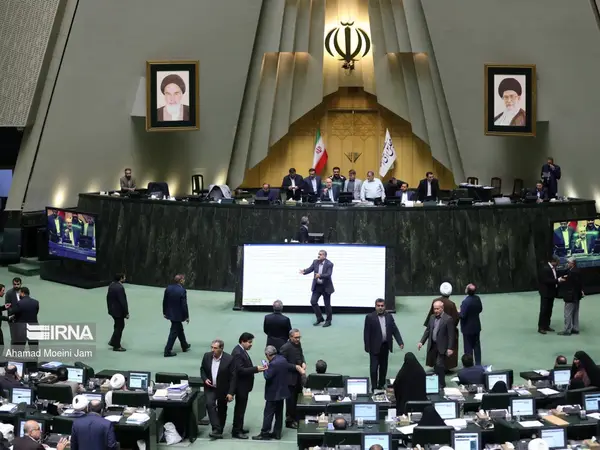Iran’s new development plan envisions granting foreign policy authority to the armed forces, nuclear agency, and intelligence ministry, separate from the foreign ministry.
As lawmakers are reviewing the country’s Seventh Development Plan, small amendments of the new plan are revealing nuances in the regime’s long-term policy orientations.
The administration of President Ebrahim Raisi submitted its Development Plan to the parliament last month. After lawmakers refused to approve the initial proposed draft, apparently for being too general and vague, the administration practically extended its expired development plan for the third time since 2021 with a few amendments and called it a new plan. The old document, the 6th Development Plan, was to be implemented between 2016 and 2021, but many parts of it have remained untouched as the government lacked the appropriate resources due to a catalogue of foreign policy and economic problems.
Through amendments to the roadmap, which works as a compass for all the state bodies, the administration seeks to de-nationalize the oil industry to cover for its debts and increase even more control over the private sector, already a tiny portion of Iran’s economy. More than 80 percent of Iran’s economy is controlled by the clerical regime, including the Revolutionary Guard, leaving little room for real businessmen or private companies to flourish. However, the amendment on the foreign policy was not included in Raisi’s proposed draft and was added by the parliament.
According to an article on the general policies of the Seventh Development Plan “for active engagement in official and public diplomacy, the country’s executive institutions (with the exception of the armed forces, the Ministry of Intelligence, and Atomic Energy Organization of Iran) are required to carry out all their actions in the field of foreign relations in coordination with the Ministry of Foreign Affairs.”
Coordination with the Foreign Ministry is not new but one somewhat peculiar addendum is the exemption of the three bodies from the need to coordinate with the Ministry of Foreign Affairs for conducting foreign relations.
The general policies for development plans are issued by Iran’s ruler Ali Khamenei and then the administration devises executive plans to actualize Khamenei’s decree. The parliament is then tasked with checking the details to see if the plans are consistent with the Supreme Leader’s orders and the constitution. The end result still needs final approval from the Guardian Council, a Khamenei-appointed and constitutionally mandated 12-member council that has a veto power over legislation passed by the parliament.
Although the Foreign Ministry and the Intelligence Ministry, as well as the country’s nuclear agency are legally part of the administration, Khamenei has direct oversight on their work. He is also the chief commander of the armed forces, which itself is spread through several military bodies such as the traditional army and the Revolutionary Guards. All these bodies are ultimately ruled by the Supreme Leader, therefore envisioning separate autonomy for foreign relations can be aimed at diversifying the regime’s official stance regarding global developments.
Faraz Daily, a website not directly controlled by the government, says the move will “weaken” the foreign ministry. “The change that the parliament has made in Article 100, exempting three important institutions from coordination with the Ministry of Foreign Affairs, can potentially lead to chaos in foreign policy,” Faraz Daily said on Sunday.
Parallel organizations are not something new in Iran’s politics, already having several intelligence institutions, but parallel foreign relations bodies can help Iran keep its hawkish anti-Western stance without strategic retreats while simultaneously pursuing diplomacy with the world. This new shift in the regime’s foreign policy is in line with Khamenei’s dictum that “diplomacy and battleground” are two complementary things which do not negate each other.





















